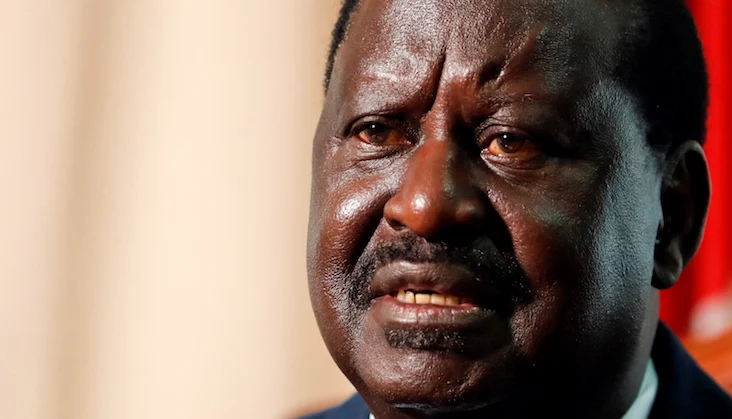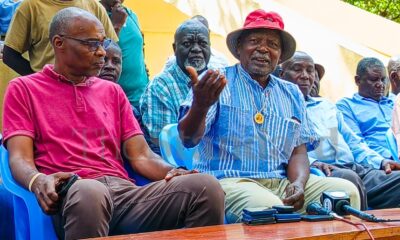Politics
Raila Rules Out Leaving Ruto’s Government Until 2027

ODM leader declares unwavering support for President’s administration through next election cycle while proposing radical electoral reforms
Orange Democratic Movement leader Raila Odinga has categorically ruled out an early exit from President William Ruto’s broad-based government, declaring his commitment to the current political arrangement until the 2027 General Election.
In a candid interview at his Karen residence on Saturday, the former Prime Minister emphasized that his party’s cooperation with the Kenya Kwanza administration is firmly anchored until the next electoral cycle, effectively ending speculation about potential political realignments before 2027.
“We have said that we are in the broad-based government until 2027. We did not say that we are going to work with UDA beyond 2027,” Odinga stated, drawing a clear distinction between current cooperation and future political alliances.
The veteran politician revealed that ODM’s decision to join the broad-based government was driven by the need to prevent Kenya from descending into chaos following last year’s youth-led protests.
Odinga disclosed that without intervention, the country risked sliding into instability similar to that experienced in Somalia, Haiti, or Sudan.
“In 2023, we were in the streets raising very concrete issues about electoral justice, cost of living and corruption. The government responded with brutality, and we lost about 70 people,” Odinga recalled, referencing the deadly confrontations between protesters and security forces.
The political veteran explained that the subsequent Gen Z uprising in June 2024 exposed deep governance cracks, prompting international mediation efforts led by Tanzanian President Samia Suluhu and Nigeria’s former President Olusegun Obasanjo.
Uhuru’s role in dialogue
In a surprising revelation, Odinga disclosed that former President Uhuru Kenyatta, who was in the United States during the height of the protests, personally urged him to initiate dialogue with President Ruto to safeguard national peace.
“Although I had ruled out engaging Dr Ruto, the crisis forced my hand. I told him the Gen Z protests arose because Nadco was not implemented,” Odinga said, referring to the National Dialogue Committee report that had been tabled in Parliament.
Electoral reform bombshell
Beyond his political commitment, Odinga dropped a policy bombshell by proposing sweeping electoral reforms that could revolutionize Kenya’s voting system.
The ODM leader called for the complete abolition of the voter register, advocating instead for a system where Kenyans vote using only their national identification cards.
“Why are Kenyan elections among the most expensive in the world? It’s not rocket science. The system is bloated to enable looting. If you have an ID, you should vote,” Odinga argued, criticizing the current procurement-heavy electoral model.
He also proposed staggering elections rather than conducting all six contests—presidential, gubernatorial, senatorial, MP, Woman Rep, and MCA—on a single day, arguing this would reduce costs and confusion.
2027 ambitions remain open
While ruling out premature succession discussions, Odinga remained coy about his own 2027 presidential ambitions. The five-time presidential candidate said he has not decided whether to run again and emphasized that any decision would be made collectively by ODM party members.
“I have not said that I’m running. I don’t have to run. I can support someone else, but I can also run if I want to. Right now, I’m focused on strengthening ODM,” he stated.
The party is set to complete elections next month and hold a National Delegates Convention in October to determine its political direction.
Despite his commitment to the current arrangement, Odinga warned that ODM’s participation comes with conditions.
He revealed that the party has established an internal task force to monitor implementation of their 10-point agreement with the government.
“There is a red line. If it is crossed, we will make a decision. Some things have been done, others have not, and we will evaluate and decide as a party,” he cautioned.
The ODM leader defended his decision to work with former political adversaries, describing it as an act of patriotism rather than compromise. “I have always stood for justice. We demanded change, and many lives were lost. We did not compromise, we acted for peace,” he said.
Criticism of divisive politics
Odinga used the interview to criticize ethnic-based political mobilization, taking particular aim at former Deputy President Rigathi Gachagua’s “shareholding” remarks, which he described as divisive and irresponsible.
“That was irresponsible. The government serves all Kenyans—not just its voters,” he stated, contrasting Gachagua’s approach with that of current Deputy President Kithure Kindiki, whom he described as “more intellectual and less ethnic.”
As Kenya navigates this unprecedented period of political cooperation between former rivals, Odinga’s declaration provides clarity on the immediate political landscape while keeping options open for the post-2027 era. His proposed electoral reforms, if implemented, could fundamentally alter how Kenyans choose their leaders.
The veteran politician’s commitment to the broad-based government until 2027 effectively stabilizes the current political arrangement while setting the stage for what promises to be an intriguing electoral contest in the next general election.
Kenya Insights allows guest blogging, if you want to be published on Kenya’s most authoritative and accurate blog, have an expose, news TIPS, story angles, human interest stories, drop us an email on [email protected] or via Telegram
-

 Business2 weeks ago
Business2 weeks agobetPawa Empire Crumbles: Mr Eazi’s Betting Gambit Unravels Amid Partner’s Shadowy Deals
-

 Business1 week ago
Business1 week agoMinnesota Fraud, Rice Saga, Medical Equipment Deal: Why BBS Mall Owner Abdiweli Hassan is Becoming The Face of Controversial Somali Businessman in Nairobi
-

 News1 week ago
News1 week agoDCI Probes Meridian Equator Hospital After Botched Procedure That Killed a Lawyer
-

 Politics1 week ago
Politics1 week agoYour Excellency! How Ida’s New Job Title From Ruto’s Envoy Job Is Likely to Impact Luo Politics Post Raila
-

 Investigations2 weeks ago
Investigations2 weeks agoEXPOSED: SHA Officials Approve Higher Payments for Family, Friends as Poor Patients Pay Out of Pocket
-

 News1 week ago
News1 week agoKenya Stares At Health Catastrophe As US Abandons WHO, Threatens Billions In Disease Fighting Programmes
-

 Politics2 weeks ago
Politics2 weeks agoJaramogi Clan Tells Raila Jr, Winnie Against Disrespecting Their Uncle Oburu, Warns of Curses
-

 Business2 weeks ago
Business2 weeks agoKRA Boss Humphrey Watanga In Big Trouble In Sh5.5 Billion Rice Import Scandal

















